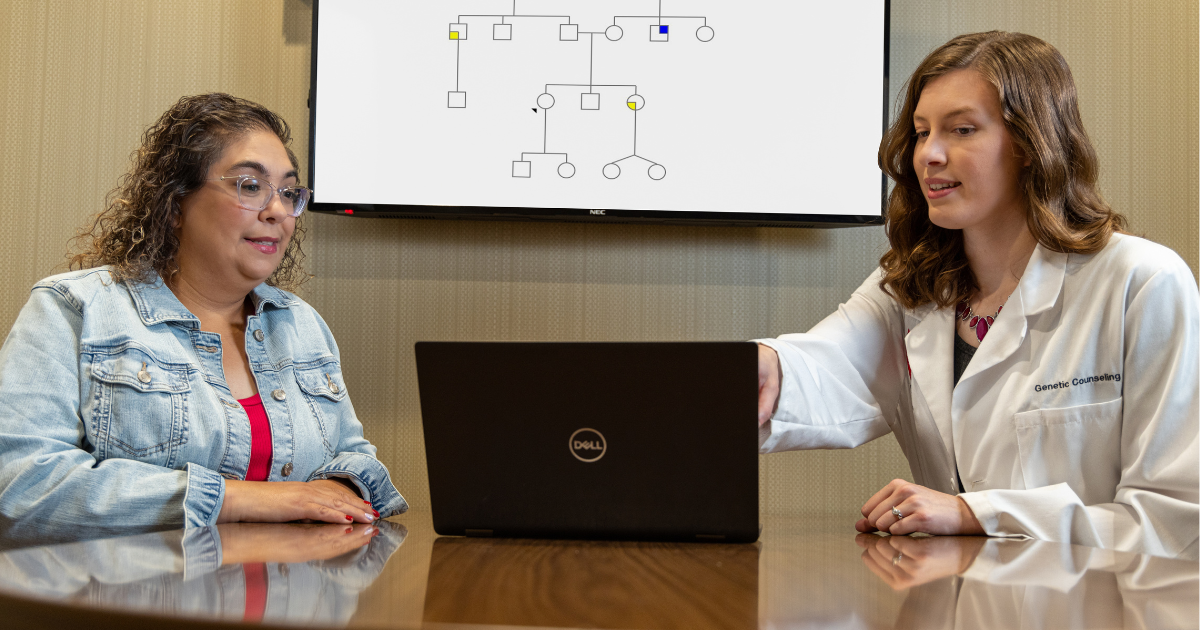What to expect with genetic testing

Genetic testing has become an increasingly important tool in health care, offering insights into our risk for certain conditions and guiding treatment decisions.
But for many patients, the process can feel daunting. What exactly happens during genetic testing? What can the results tell you? And how might they impact your life?
Jessie Poskochil, a Nebraska Medicine genetic counselor who helps patients navigate the complex world of genetic testing, explains the process and what to expect.
Genetic testing basics
Genetic testing examines your DNA for specific changes or variants that may increase your risk of developing certain conditions.
If your doctor recommends genetic testing, you'll likely meet with a genetic counselor like Poskochil. These specialists help explain the testing process, discuss potential outcomes and address any concerns you may have.
When she meets with patients, Poskochil first explains the basics of genes and DNA and how genetic variations can influence health.
"We talk about what a cell is, what a gene is,” she says. “Because people learn in a variety of ways, I always make visual aids and provide handouts to take home with them.”
Additionally, Poskochil reviews her patient’s personal and family medical history. This information helps determine which genetic tests are most appropriate for their situation.
The actual test usually involves a blood draw or saliva sample. The collected DNA is then analyzed in a laboratory for genetic variants associated with an increased risk of certain conditions.
Understanding your results
Results generally fall into three categories:
- Positive: A variant associated with an increased risk of a specific condition was identified.
- Negative: No risk-associated variants were found.
- Uncertain: A variant was found, but its significance is unclear.
Once your results are ready, your genetic counselor will call you to discuss the findings.
“We discuss what the results mean for the patient and talk about what they mean for their family members,” Poskochil says.
If your test reveals an increased risk for a particular condition, your genetic counselor will discuss potential next steps. These may include:
- Enhanced screening: More frequent or earlier cancer screenings, for example.
- Preventive measures: Lifestyle changes or preventive surgeries to reduce risk.
- Family testing: Recommendations for which family members may consider genetic testing.
For patients who have an increased risk of developing certain cancers, Poskochil often provides a referral to the Cancer Risk and Prevention Clinic.
“The clinic has specialized advanced practice providers who can order screenings, like mammograms or MRIs,” Poskochil says.
Poskochil stresses that patients should work with their care team to find the best plan for their circumstances. She provides patients with a letter that explains their results, which is also uploaded to their OneChart account and sent to their primary care provider. This helps ensure the patient’s care team is on the same page.
Common concerns and misconceptions
Many patients worry about the cost of genetic testing, but Poskochil says this might not be based on current information.
"The cost has dramatically come down in the past few years, and if even if insurance didn't cover the cost, the out-of-pocket price for a hereditary cancer gene panel test is usually around $250,” she says. “So, it’s much more affordable now."
Another common misconception is that a positive result means you'll definitely develop the associated condition.
"It's important to know that genetic testing isn't a crystal ball,” Poskochil says. “It won't tell us if you will develop the condition or when you will develop it – just that you have a higher chance than the general population."
Privacy and discrimination concerns
Many patients worry about how genetic test results might affect their insurance or employment.
"In the U.S., we have a federal law called the Genetic Information Non-Discrimination Act, put in place in 2008,” Poskochil explains. “It protects most individuals in most scenarios from having their genetic testing results used against them for health insurance discrimination or employment discrimination."
However, Poskochil notes that this law doesn't cover life insurance, disability insurance or long-term care insurance. Therefore, it's important to discuss these potential implications with your genetic counselor before testing.
Support and resources
Receiving genetic test results, especially if they indicate increased risk, can be emotionally challenging. Having support through this process is key, Poskochil says.
"We always want patients to feel empowered, and even if they don't choose to do anything with this information, they have the knowledge and can be proactive if they want to be,” she says.
Poskochil recommends exploring resources with your counselor, including local support groups, national organizations and referrals to specialists as needed.
Looking ahead
Although genetic testing can offer significant information about your health risks, deciding whether to pursue it and managing the results can be complex. Genetic counselors can guide you through your choices and serve as an important resource throughout the process.







